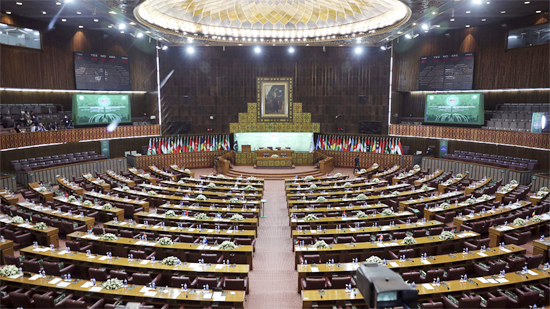CGTN
Pakistan will host the 48th Council of Foreign Ministers (CFM) of the Organization of Islamic Cooperation (OIC) in Islamabad from March 22 to 23. The session will coincide with the 75th anniversary of Pakistan’s independence. While Palestine and Kashmir have remained a permanent agenda item on the organization’s agenda, there are also issues of Islamophobia, terrorism and the situations in Bosnia, Yemen and Libya. Millions of our Afghan brethren still remain at the mercy of international aid and confront an uncertain future at the hands of hunger and disease. The deleterious impact of the COVID-19 pandemic is yet to be fully contained.
The proposed theme of the 48th Session, “Partnering for Unity, Justice and Development,” is a clarion call not only for the Muslim world but the entire humanity facing discrimination. While Pakistan may seek to build “partnerships” across the Islamic world and build bridges of cooperation to address the challenges facing Ummah, or the Muslim community, there is also a need to look at the emerging geopolitical paradigm at the regional level. Special attention has to be paid to the regions suffering from perennial tensions in the Muslim world, such as the Middle East.
Held under the shadows of the Ukraine crisis, in which the world is once again pushed to the renewed Cold War, the OIC meeting will have the opportunity to look at the emerging threats to the world and options that the Islamic world can avail to put across its point of view effectively.
The OIC meeting assumes importance because of the severe sanctions imposed on Russia by the U.S. and EU countries. The most affected sector under these sanctions is energy. Russia is the world’s top exporter of crude and oil products combined, producing about seven million barrels per day, or seven percent of global supply. In addition, Russia is the world’s largest grains and fertilizers exporter and a top producer of palladium, nickel, coal and steel. The bid to exclude its economy from the trading system will therefore hit a wide range of industries and add to global food security fears though many Islamic countries, endowed with vast energy resources, may have windfall profits due to the sanctions on Russia.
The forthcoming CFM should afford a rare opportunity for the member states to formulate a common position about the world challenges. It would also be a rare occasion to draw lessons from the partisan attitude of the West toward white people and the people of color. While the Ukrainians have been welcomed in Europe as normal citizens, Asians escaping Ukraine faced discrimination and slurs at the Polish and Romanian borders without refugee status.
Although the OIC countries have realized that few countries have supported the Russian military operation on Ukraine, the attitude of the U.S. and EU is equally reprehensible to instigating Ukraine to provoke a violent response from Russia. Behind the Russian attack lie the severe Russian complaints against the American and European attitude of pushing the envelope while expanding the North Atlantic Treaty Organization well beyond the Western threat perception.
The Islamic countries will have to look at the emerging Cold War situation from twin agenda points, first dealing with peace, security and stability in the Muslim countries, and second, how to refrain from block-politics to secure their interests. Indeed, none of the Islamic countries’ situation is ideal. Apart from external interference in the name of “Arab Spring,” which caused disasters for Tunisia, Libya, Egypt, Iraq and Syria, the Islamic countries have been grappling with tensions within their ranks, such as Saudi-Iranian tussle in the region.
Secondly, the entire Islamic world will sooner be facing a stark choice of either supporting the U.S.-led global order or the one which defies its dictates. After the end of the Cold War, Francis Fukuyama’s book, “The End of History and the Last Man,” made a sweeping statement that humankind had “reached the end-point of post-war history and the universalization of Western liberal democracy as the final form of human government.”
However, it did not happen as predicted by Fukuyama. China’s rise based on “meritocracy” set a new paradigm through whole-process people’s democracy. The country has lifted over 800 million out of poverty – a marvel that the best democracies could only dream about.
But the U.S.-led Western order, through their military-industrial complex, may push the world into bloc politics. Just look at the post-9/11 scenario, where Islamic countries have been on the receiving end. Countless Muslims were killed in Afghanistan, Iraq, Libya and Syria on the U.S. watch, and millions became refugees on various continents. Naturally, the emerging order would directly impact the Islamic world, which spans over a vast geographical expanse connecting Europe, Africa and Asia. Individually, Islamic countries could be pressurized to join the American-led world.
Alternatively, however, the OIC has a choice whether to emerge as a neutral bloc to assert its identity or as a formidable alliance with friendly relations with the American-led world and other countries. The OIC can decide on peace and security issues on merit. Moreover, a neutral OIC can also play the role of a mediator between the countries in conflict. Given the divisions within the Islamic Ummah’s ranks, a unified neutral stance over the renewed Cold War may sound premature. Still, the gathering storm on the international horizon would soon force the countries to adopt a unified stance for their individual and regional interests.





